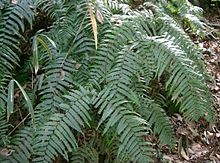Gleicheniaceae
| Forked ferns Temporal range: | |
|---|---|

| |
| Diplopterygium pinnatum | |
| Scientific classification | |
| Kingdom: | Plantae |
| Clade: | Tracheophytes |
| Division: | Polypodiophyta |
| Class: | Polypodiopsida |
| Order: | Gleicheniales |
| Family: | Gleicheniaceae (R.Br.) C.Presl |
| Subfamilies | |
|
See text | |
| Synonyms | |
| |
The forked ferns are the family Gleicheniaceae, which includes six genera and about 160 known species.[1] The formerly independent families Dicranopteridaceae and Stromatopteridaceae are generally included in the Gleicheniaceae, whereas the Dipteridaceae and Matoniaceae, although closely related, are considered separate families by most authors.[2]
Description
These tropical ferns are the most widespread living lineage of Gleicheniales. Their rhizomes have a "vitalized" protostele or in some taxa a solenostele. The leaves are indeterminate, with pseudodichotomously forked leaves except in Stromatopteris, and free veins. Stromatopteris also differs from the other species in having an achlorophyllous and subterranean gametophyte.[3] The sori are abaxial but not marginal and carry 5–15 exindusiate round sporangia each. These have a transverse-oblique annulus and contain 128 to 800 bilateral or globose-tetrahedral spores. The sori and sporangia mature at the same time, and the spores grow into surface-dwelling green prothalli beset with club-shaped hairs.[2]
Systematics
There is some dispute about ranking these ferns. They are typically placed in the order Gleicheniales. They may alternatively be considered a subclass Gleicheniatae or class Gleichenopsida, so that a distinct taxon can be established for the leptosporangiate ferns. In this case, the Gleicheniaceae are upranked to an order and receive the name Gleicheniales. Irrespective of their modern taxonomic treatment, the Gleicheniaceae were formerly included in the order Polypodiales. But the ferns in the loose sense are much too diverse a group to be shoehorned into one taxon at such a low rank.[2]
The Triassic Antarctipteris and Gleichenipteris are sometimes ascribed to the Gleicheniaceae, but are probably better considered Gleicheniales incertae sedis.[2] There are seven extant genera recognized as of February 2020[4][5]
Phylogeny of Gleicheniaceae by Nitta et al. 2022[6] and Fern Tree of life[7]
| |||||||||||||||||||||||||||||||||||||
Footnotes
- ^ Christenhusz, M. J. M.; Byng, J. W. (2016). "The number of known plants species in the world and its annual increase". Phytotaxa. 261 (3). Magnolia Press: 201–217. doi:10.11646/phytotaxa.261.3.1.
- ^ a b c d Smith et al. (2006)
- ^ Identifying cryptic fern gametophytes using DNA barcoding: A review
- ^ PPG I (2016). "A community-derived classification for extant lycophytes and ferns". Journal of Systematics and Evolution. 54 (6): 563–603. doi:10.1111/jse.12229. S2CID 39980610.
- ^ Liu, Hongmei; Rakotondrainibe, France; Hennequin, Sabine; Schneider, Harald (April 2020). "The significance of Rouxopteris (Gleicheniaceae, Polypodiopsida): a new genus endemic to the Madagascan region". Plant Systematics and Evolution. 306 (2): 30. doi:10.1007/s00606-020-01657-9. ISSN 0378-2697. S2CID 211479513.
- ^ Nitta, Joel H.; Schuettpelz, Eric; Ramírez-Barahona, Santiago; Iwasaki, Wataru; et al. (2022). "An Open and Continuously Updated Fern Tree of Life". Frontiers in Plant Science. 13: 909768. doi:10.3389/fpls.2022.909768. PMC 9449725. PMID 36092417.
- ^ "Tree viewer: interactive visualization of FTOL". FTOL v1.3.0. 2022. Retrieved 12 December 2022.
References
- A. R. Smith, A. R. Kathleen, M. Pryer, E. Schuettpelz, P. Korall, H. Schneider & P. G. Wolf. 2006. A classification for extant ferns. Taxon 55(3): 705–731. PDF fulltext
- C. Michael Hogan. 2010. Fern. Encyclopedia of Earth. eds. Saikat Basu and C. Cleveland. National Council for Science and the Environment. Washington, D.C.
